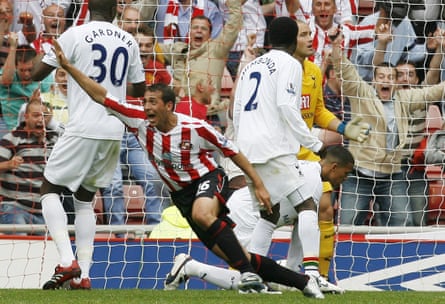It would not be a Premier League opening week without football-starved fans and pundits leaping to some kneejerk conclusions.
Sunderland, tipped by many to make a swift return to the Championship, caused the biggest upset of the weekend with a thumping 3-0 win over West Ham, marking their first Premier League success in the month of August since 2010. Suddenly Sunderland are being talked up as safe, West Ham as doomed, and Graham Potter already on borrowed time.
Brentford, Burnley and Everton joined West Ham in being dragged into the relegation fight conversation, with their respective 3-1, 3-0, and 1-0 defeats sparking talk that all could now be in for a tense survival battle.
It was not just the bottom of the table making headlines; Pep Guardiola’s six-time champions, Manchester City, ranked third favourites behind Arsenal and Liverpool for the title this season, swept aside Wolves 4-0 thanks to two goals from Erling Haaland. The result made them the Premier League’s most in-form side over the last 20 games with 43 points, and reignited talk that City look back to their pre-Rodri injury best, with Haaland firmly on course for another Golden Boot.
Liverpool’s 4-2 win over Bournemouth has dampened talk of another comfortable title charge, with defensive frailties drawing concern and the former defender Jamie Carragher warning: “If Liverpool continue like that, I don’t think they will win the league.”
Elsewhere, Chelsea were described as rudderless in their 0-0 draw with Crystal Palace, raising concerns that they need another gear, a far cry from their pre-season hype as top-spot challengers.
Unfortunately for the likes of Sunderland and Manchester City, and perhaps fortunately for those sides already written off, history shows that the first day of the season is not a reliable indicator of how a team will fare over the campaign.
A glance back at previous seasons provides plenty of evidence. Sunderland fans, in fact, should know better than most that an opening-day win is no guarantee of a smooth season. In 2007-08, the Black Cats began with a last-minute Michael Chopra winner against Spurs, only to finish just three points above the relegation zone. A more striking cautionary tale came in 2010-11, when the newly promoted Blackpool thrashed Wigan 4-0 on the opening weekend, sparking survival hopes. They went on to win just nine more league games all season and dropped straight back into the Championship. One good afternoon in August can be quickly forgotten once the grind of the full season sets in.

On the same weekend that the Seasiders were revelling in their first top-flight win in over 39 years, fellow newly promoted side, West Brom, were on the receiving end of a 6-0 battering from Chelsea. While most assumed they were nailed on for the drop out of the two sides, it was Roberto Di Matteo/Roy Hodgson’s side that stayed up, finishing 11th in the league. Burnley fans will no doubt take solace in hearing this.
History is littered with similar turnarounds. Portsmouth in 2005-06 lost 2-0 to Tottenham on the opening week and, with 10 games remaining, were eight points adrift of safety, yet they claimed 20 points from a possible 27 to finish ninth. West Ham in 2022-23 stumbled out of the blocks with a 2-0 defeat by Manchester City and three opening losses, sitting 16th at Christmas, only to recover and win the Europa Conference League while finishing 14th in the league. Crystal Palace in 2017-18 endured seven straight defeats without scoring under Frank de Boer and Hodgson, seemingly written off by September, but rallied to finish 11th. Even Everton in 2004-05, hammered 4-1 at home by Arsenal and tipped for relegation after losing Wayne Rooney that summer, enjoyed a remarkable season that saw them finish fourth and qualify for the Champions League. These examples prove that early jitters rarely dictate the final outcome. Brentford and West Ham fans, maybe do not hit the panic button just yet.
after newsletter promotion

Rocky starts do not always bury title chances either, Manchester United are proof of that. In the 1992-93 season Alex Ferguson’s side began their campaign with a 2-1 loss at Sheffield United and a 3-0 defeat at the hands of Everton before going on to win the inaugural Premier League title by 10 points. In 1995-96 Alan Hansen’s famous “You can’t win anything with kids” jibe after a 3-1 loss to Aston Villa was answered with another championship. Even in 2007-08, when United opened with a 0-0 draw against Reading and went three games without a win, they recovered to storm to the title and added the Champions League for good measure. In the 2021-22 season, Manchester City suffered an opening day loss at Tottenham but Pep Guardiola’s side still went on to win the second of a record four consecutive titles. The title will not be decided in August, no matter how convincing City looked, how shaky Liverpool’s defence seemed, or how hopeful Arsenal fans feel.

After a Premier League opening weekend that threw up some shocks and unforeseen results, pundits and fans were quick to declare who was safe, who was doomed and who would lift the trophy. But history reminds us that early results can be misleading. From Blackpool’s collapse to West Ham and Everton defying early predictions, the first day rarely tells the full story. So, whether City are back, or if Sunderland look safe from relegation, one thing is clear: the Premier League title, and the battles at the bottom, will not be decided in August.
This is an article by WhoScored
